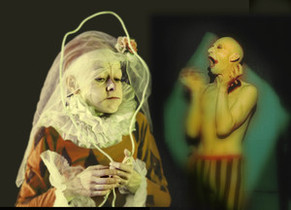
In this brief essay, we will survey the American avant-garde theatre of the 1950s going forward, analyze what these innovators have in common, describe the climate in which they occurred, and discuss the notion that true avant-garde never truly began and ended; it simply burped. First, let us examine exactly what the avant-garde movement is. Merriam-Webster defines it poorly and thusly: “…a group of people who develop new and often very surprising ideas in art, literature, etc.” That being the case, we can argue that the entire species eventually does this all the time. Big whoop! So let it be further said that the avant-garde is the idea of pushing or breaking boundaries, rules, that it concerns itself chiefly with not representing the status quo which is exactly what brought the movement originally about: The status-quo of the day of the avant-garde’s rise in the United States was unadulterated cultural boredom. If we agree to this idea, then the idea of a so-called movement becoming collective and popular is actually representative of the aforementioned ‘burp’ and in no way resembles the very idea avant-garde proposes: to be different.
Within the scope of this paper, we cannot get into great detail about the leaders of the ‘burp’. But we can illuminate a few who were of such powerful persuasive innovation that many in the experimental exploration of theatre today stand atop their shoulders. Specifically to the United States, the first widely discussed theatrical scientist was Alfred Jerry and his Ubu plays. Jerry’s characters were cartoonish, buffoonish, his worlds abstract and oddly angled, and audiences either delighted or recoiled (or both) to hear the first word of the play which will neither be linear nor of the stale well-made-play: “SHIT!” Jerry caused an uproar, had his detractors and defenders, and thus a big avant-garde splash in the United States’ pond was made. There was the trifecta of Brecht [of no answers], Boal [direct reaction to action], and Artaud [poking in, and around the subconscious.] We would be remiss to leave out the holy inspiration of Pirandello who, like Jesus, led the way on a proverbial mule—from Italy to the theatre of the absurd: the U.S.A. The similarities amongst all these innovators was that they all strived to find new and different ways to perform and interact with an audience. Fluxus, Happenings, Neo-Dada, Chance Poetry, audience interaction, flexible seating and people, and a little bit of skin. World War II had surely worn down the sensibilities of Americans and something had to shake them out of their collective shell-shock. What better than those things which made no sense, lit conventionality on fire, showed the world that it was alright to be a buffoon or a balloon, or an emotion disguised as a dance in a poetry mask, so long as something was created rather than destroyed. But then came the ‘burp’.
Capitalism loves a good sell, and theatre needs to make money to survive leaving occasionally awful bed-partners when it comes to creativity and deep cultural story-telling. So we saw the psychedelic and the surreal imagery used to sell music and fashion and television shows and movies. In short, everybody was doing it. That was the ‘burp’. Then Andy Warhol arrived and was truly avant-garde when he destroyed it all on every level: TV, theatre, art, music, and fashion, photography, and wig manufacturers.
The truth is this: avant-garde theater never began and never ended. It has been with us and the evidence is simply in the innovations that continue to adapt and modify to the ever changing needs and challenges of American audiences and audiences all around the world. There are old and new experimental theatres all over the country [The Living Theatre, Boston Experimental, Cutting Ball Theatre, even NYU has a dedicated experimental wing] all busy at work being unheralded, disregarded, maligned, chastised and ignored, while at the same time saving culture and humanity one little audience at a time, as they should. In secret, uniquely. God forbid this stuff should ever get popular again, or it will burp its last and destroy the Earth.
Sources Cited:
(1). "Avant-garde." Merriam-Webster. Merriam-Webster. Web. 26 Apr. 2014.
~Tom Miller
 RSS Feed
RSS Feed
